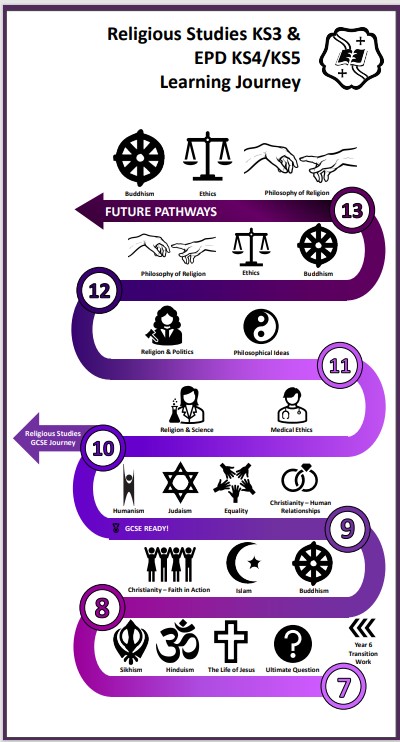At Key Stage 3 students undertake an Ethical and Personal Development programme which incorporates elements of Religious Studies, Citizenship and PSHE. The course is designed to develop personal awareness, values and opinions, whilst also developing a student’s analytical, written and communication skills.

Our EPD course encourages students to develop their knowledge, understanding and skills to engage in debate and discussion about life in a modern pluralistic society. This includes a study of both religious and non-religious beliefs. The course also encourages students to develop and understand personal values and beliefs, with an emphasis on critical analysis and the ability to construct balanced and informed arguments within the context of religious, philosophical, ethical and social awareness.
Exam Board:
Qualification Title: EPD
Qualification Specification Code:
Qualification Webpage: Click here to visit the webpage for the specification.
The course is part of the core programme and is undertaken by all students. It provides a great opportunity for students to engage with current issues and to develop social, cultural, political, historical and personal awareness. It encourages students to understand who they are as individuals and how to make informed choices. The course helps students to develop personal beliefs and values and a sense of identity. This course is particularly complementary to the GCSE Philosophy and Ethics option.
Students undertake a comparison between science and ethics, with a focus on medical ethics, animal rights and environmental issues and how these impact our personal and social responsibilities. In addition, the EPD course covers important elements of PSHE and SRE including sex and contraception, personal finance and student wellbeing. The content of the course works together with the PSHE programme delivered in tutor time.

This course is assessed through regular written and verbal feedback. There is no formal qualification attached to the course.
Mrs Downie, Mr Goddard or Mr Yapp
Owned by: MDS | Last Published: 20/09/2019 09:53:36 | Next Update: N/A